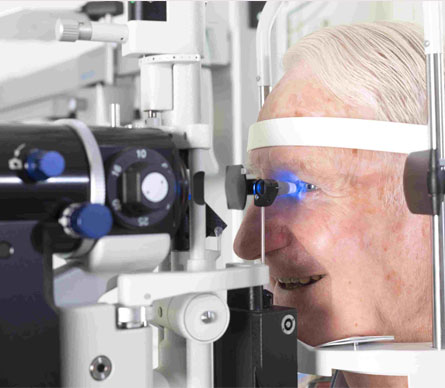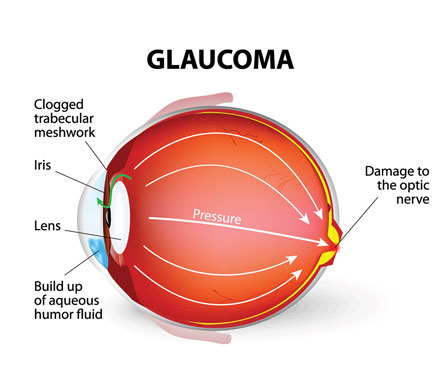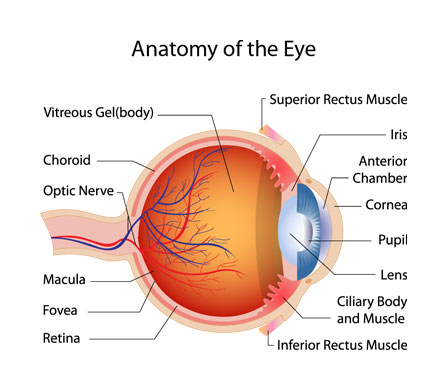
Patient education
Information
About
Glaucoma


What is glaucoma?
Glaucoma is a group of diseases where the optic nerve (nerve which helps us to see) is gradually damaged, when the pressure inside the eye is higher than what the optic nerve can withstand.
What happens in glaucoma?
When the optic nerve becomes weak, the person gradually loses vision. In early glaucoma,peripheral vision of the person is gradually lost.To perform our day to day activities, our central vision is necessary so the gradual progressive loss of peripheral vision goes unnoticed by the patient. By the time one realizes about the visual disability, the glaucoma has become advanced hence this disease is often said to be “the sneak thief of sight.”


What causes glaucoma?
Usually in glaucoma the intraocular pressures rises or fluctuates and this causes damage to the Optic nerve.The Intraocular pressure is maintained because of a fluid called aqueous humor circulating in the eye. If there is an imbalance between the production and drainage of aqueous humors, it causes the Intraocular pressure to rise or fluctuate.
What are the symptoms of glaucoma?
- Usually ASYMPTOMATIC
- Blurred vision
- Seeing coloured haloes
- Partial /peripheral loss of vision
- Frequent change of presbyopic glasses
- Redness, pain and heaviness in the eyes


What are the tests used to diagnose glaucoma?
Diagnosis of glaucoma needs a comprehensive eye examination
The common tests used are :
- Tonometry (Intraocular measurement)
- Gonioscopy (Looks into the drainage pathway of the eye)
- Dilated Fundus examination (Looks into the Optic Nerve Head)
- Perimetry (Visual field testing)
- OCT (Ocular Coherence Tomography)
How is glaucoma treated?
Once glaucoma has been diagnosed, treatment should begin at the earliest to help minimize the risk of permanent vision loss. There is no cure for glaucoma, so treatment focuses on relieving symptoms and preventing further damage from occurring. Most cases of glaucoma can be treated with eye drops, laser surgery or microsurgery. The best treatment for your individual case depends on the type and severity of the disease, and can be discussed with your doctor.
- Eye drops are used to reduce fluid production in the front of the eye or to help drain excess fluid.
- Laser surgery for glaucoma aims to increase the outflow of fluid from the eye or eliminate fluid blockages through laser trabeculoplasty, iridotomy or cyclophotocoagulation.
- Microsurgery involves a surgical procedure called a trabeculectomy, which creates a new channel to drain fluid from the eye and reduce the pressure that causes glaucoma.


How long should I use medicines?
Glaucoma needs lifelong treatment. The medications can change depending on the severity of the disease and the control of Intraocular pressure. The changes in Intraocular pressure and the progression of the disease can be assessed by regular followup. Regular follow up and putting the eyedrops on time are the key to control glaucoma.
How can I prevent glaucoma?
While there are no foolproof ways to prevent glaucoma from developing, regular screenings and early detection are the best forms of protection against the harmful damage that the disease can cause. While anyone can develop glaucoma, some people are at a higher risk for developing disease. These people may include those who:
- Are over the age of 40
- Have a family history of glaucoma
- Have poor vision
- Have diabetes


How can you help successfully manage glaucoma ?
- Take your medicines regularly as prescribed.
- Do not stop medications without consulting your doctor.
- Regular followup visits as suggested by your doctor. These visits will ensure that your disease is not worsening.
- Do not miss appointments for the tests of glaucoma (perimetry) which will help your doctor judge your disease progression.
- Know your risk factors and get yourself examined at the earliest.
- A diagnosis of glaucoma does not necessarily mean blindness. Early diagnosis and appropriate treatment can halt the progress of glaucoma.
Myths And Facts

Educational Video